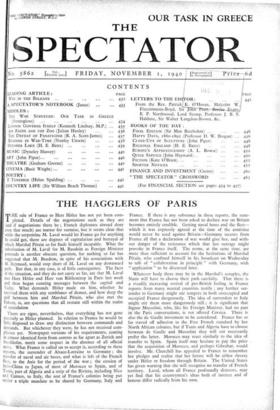THE HAGGLERS OF PARIS
THE sale of France to Herr Hitler has not yet been com- pleted. Details of the negotiations such as they are (and if negotiations there be ; French diplomats abroad deny even that much) are matter for surmise, but it seems clear that while the serpentine M. Laval would let France go for anything he could get, there are degrees of capitulation and betrayal of which Marshal Petain so far finds himself incapable. What the substitution of M. Laval for M. Baudoin as Foreign Minister portends is another obscure question, for nothing so far has suggested that M. Baudoin, in spite of his associations with M. Reynaud, would stop short of M. Laval on any downward Path. But that, in any case, is of little consequence. The facts of the situation, and they do not carry us far, are that M. Laval met Herr Hitler and Herr von Ribbentrop in Paris last week and then began running messages between the capital and Vichy. What demands Hitler made on him, whether he received them with any semblance of demur, and how deep the gulf between him and Marshal Petain, who also met the Eihrer, is, are questions that all remain still within the realm of speculation There are signs, nevertheless, that everything has not gone precisely as Hitler planned. In relation to France he would be Effie disposed to draw any distinction between commands and demands. But whichever they were, he has not received com- pliance yet. Newspaper versions of his requirements, coming in almost identical form from centres as far apart as Zurich and Stockholm, merit some respect in the absence of all official news. What France is called on to accept is, according to these reports, the surrender of Alsace-Lorraine to Germany ; the transfer of naval and air bases, and what is left of the French fleet, to the Axis for the period of the war ; the cession of Indo-China to japan, of most of Morocco to Spain, and of Tunis, part of Algeria and a strip of the Riviera, including Nice and Cannes, to Italy, the rest of France's colonies being put under a triple mandate to be shared by Germany, Italy and France. If there is any substance in these reports, the state- ment that France has not been asked to declare war on Britain becomes entirely credible. Getting naval bases and the fleet— which it was expressly agreed at the time of the armistice would never be used against Britain—Germany secures from France all that a declaration of war would give her, and with- out danger of the resistance which that last outrage might provoke in France itself. The terms, at the same time, are more than sufficient to account for the hesitations of Marshal Petain, who confined himself in his broadcast on Wednesday to talk of " collaboration in principle " with Germany, with " application " to be discussed later.
Whatever body there may be in the Marshal's scruples, the Nazis will have to choose their path carefully. That there is a steadily increasing revival of pro-British feeling in France reports from many neutral countries testify ; any further sur- render to Germany might stir tempers in both unoccupied and occupied France dangerously. The idea of surrenders to Italy might stir them more dangerously still ; it is significant that Signor Mussolini, who, like his Foreign Minister, had no part in the Paris conversations, is not offered Corsica. There is also the de Gaulle movement to be considered. France has so far staved off adhesion to the Free French standard by her North African colonies, but if Tunis and Algeria have to choose between de Gaulle and Mussolini they will not necessarily prefer the latter. Morocco may react similarly to the idea of transfer to Spain. Spain itself may hesitate to pay the price that the acquisition of Morocco, and perhaps Gibraltar, would involve. Mr. Churchill has appealed to France to remember her pledges and realise that her future will be either slavery under Hitler or freedom through Britain. The United States has given warning that she will recognise no transfer of French territory. Laval, whom all France profoundly distrusts, may yet find that his countrymen's ideas both of interest and of honour differ radically from his own.






































